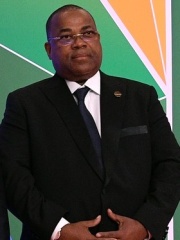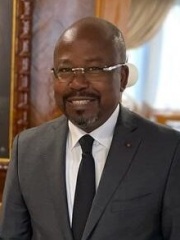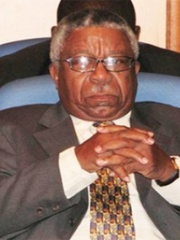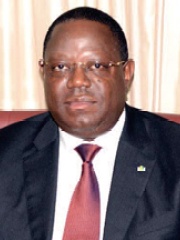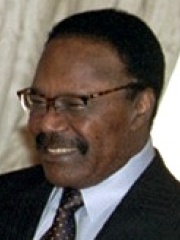
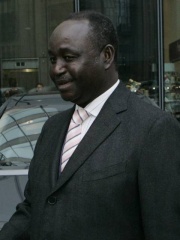
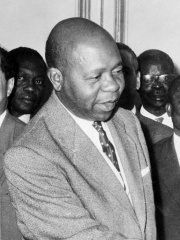
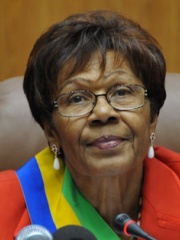
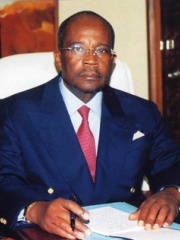
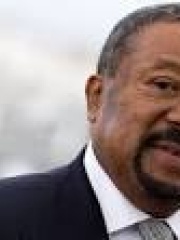
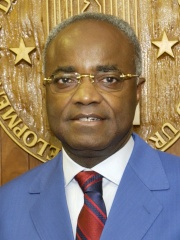
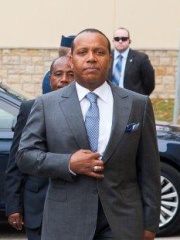
The Most Famous
POLITICIANS from Gabon
This page contains a list of the greatest Gabonese Politicians. The pantheon dataset contains 19,576 Politicians, 16 of which were born in Gabon. This makes Gabon the birth place of the 127th most number of Politicians behind Burkina Faso, and Turkmenistan.
Top 10
The following people are considered by Pantheon to be the top 10 most legendary Gabonese Politicians of all time. This list of famous Gabonese Politicians is sorted by HPI (Historical Popularity Index), a metric that aggregates information on a biography's online popularity. Visit the rankings page to view the entire list of Gabonese Politicians.

1. Omar Bongo (1935 - 2009)
With an HPI of 70.46, Omar Bongo is the most famous Gabonese Politician. His biography has been translated into 68 different languages on wikipedia.
Omar Bongo Ondimba (born Albert-Bernard Bongo; 30 December 1935 – 8 June 2009) was a Gabonese politician who was the second president of Gabon from 1967 until his death in 2009. A member of the Gabonese Democratic Party (PDG), Bongo was promoted to key positions as a young official under Gabon's first President Léon M'ba in the 1960s, before being elected the second vice president in his own right in 1966. In 1967, after M'ba's death, he became the country's president. Bongo headed the single-party regime of the PDG until 1990, when, faced with public pressure, he was forced to introduce multi-party politics into Gabon. His political survival despite intense opposition to his rule in the early 1990s seemed to stem once again from consolidating power by bringing most of the major opposition leaders at the time to his side. The 1993 presidential election was extremely controversial but ended with his re-election then and the subsequent elections of 1998 and 2005. His respective parliamentary majorities increased and the opposition became more subdued with each succeeding election. After Cuban leader Fidel Castro stepped down in February 2008, Bongo became the world's longest-ruling non-royal leader, retaining this distinction until his death the following year. Bongo's government received strong diplomatic, financial and military backing from its former coloniser France (tied to the presence of French oil giant Elf and subsequently Total in the country). He was criticised for in effect having worked for himself, his family and local elites and not for Gabon and its people despite an oil-led GDP per capita growth to one of the highest levels in Africa. Press freedom was curtailed by the regime, which typically banned news outlets critical of Bongo or his entourage. He is also suspected to have been involved in assassinations including those of Ndouna Dépénaud, Joseph Rendjambé and (in France) Robert Luong. After Bongo's death in June 2009, his son Ali Bongo, who had long been assigned key ministerial responsibilities by his father, was elected to succeed him in August of that year, serving until he was overthrown by his cousin in 2023.

2. François Bozizé (b. 1946)
With an HPI of 66.00, François Bozizé is the 2nd most famous Gabonese Politician. His biography has been translated into 47 different languages.
François Bozizé Yangouvonda (born 14 October 1946) is a Central African politician who was President of the Central African Republic from 2003 to 2013. He was the only Central African president born in modern-day Gabon. Bozizé rose to become a high-ranking army officer in the 1970s, under the rule of Jean-Bédel Bokassa. After Bokassa was ousted, Bozizé served in the government as Minister of Defense from 1979 to 1981 and as Minister of Information from 1981 to 1982. He participated in a failed 1982 coup attempt against President André Kolingba and subsequently fled the country. Years later, he served as Army Chief of Staff under President Ange-Félix Patassé, but began a rebellion against Patassé in 2001. Bozizé's forces captured the capital, Bangui, in March 2003, while Patassé was outside the country, and Bozizé took power, ushering in a transitional period of government. He won the March–May 2005 presidential election in a second round of voting, and was re-elected in the January 2011 presidential election, winning the vote in the first round. In December 2012, the CAR was plunged into an uprising by rebel forces who condemned the Bozizé government for not honoring peace agreements after the Central African Republic Bush War in 2007. On 24 March 2013, Bozizé fled to Cameroon via the Democratic Republic of the Congo after the rebel forces attacked Bangui and took control of the presidential palace. There, he was housed by Paul Biya, president of Cameroon. On 29 May 2013, an international arrest warrant was issued against Bozizé by the Central African Republic.

3. Léon M'ba (1902 - 1967)
With an HPI of 65.84, Léon M'ba is the 3rd most famous Gabonese Politician. His biography has been translated into 41 different languages.
Gabriel Léon M'ba (9 February 1902 – 28 November 1967) was a Gabonese politician who served as both the first Prime Minister (1959–1961) and later, the President of Gabon, from 1961 until his death in 1967. A member of the Fang ethnic group, M'ba was born into a relatively privileged village family. After studying at a seminary, he held a number of small jobs before entering the colonial administration as a customs agent. His political activism in favor of black people worried the French administration, and as a punishment for his activities, he was issued a prison sentence after committing a minor crime that normally would have resulted in a small fine. In 1924, the administration gave M'ba a second chance and selected him to head the canton in Estuaire Province. After being accused of complicity in the murder of a woman near Libreville, he was sentenced in 1931 to three years in prison and 10 years in exile. While in exile in Oubangui-Chari, he published works documenting the tribal customary law of the Fang people. He was employed by local administrators, and received praise from his superiors for his work. He remained a persona non grata to Gabon until the French colonial administration finally allowed M'ba to return his native country in 1946. After returning from exile, he began his political ascent by founding the Gabonese Mixed Committee. After his party broke ties with the French Communist Party in 1951, it was allowed to run in French Gabon elections and he was elected to the Territorial Assembly in 1952. After becoming mayor of the capital city, Libreville, in 1956, M'ba quickly rose to prominence and was appointed the vice-president of the governor's council on 21 May 1957, the highest position held by a native African in French Gabon. In 1958, he directed an initiative to include Gabon in the Franco-African community further than before. After independence, he served as the first Prime Minister of Gabon from 27 February 1959 until 21 February 1961. He became the first President of Gabon on 17 August 1960. Political nemesis Jean-Hilaire Aubame briefly assumed the office of president through a coup d'état in February 1964, but order was restored days later when the French intervened. M'ba was reelected in March 1967, but died of cancer in November 1967 and was succeeded by his vice president, Albert-Bernard Bongo.

4. Rose Francine Rogombé (1942 - 2015)
With an HPI of 64.54, Rose Francine Rogombé is the 4th most famous Gabonese Politician. Her biography has been translated into 37 different languages.
Rose Francine Rogombé (née Etomba; 20 September 1942 – 10 April 2015) was a Gabonese politician who was acting president of Gabon from June to October 2009, following the death of long-time President Omar Bongo. She constitutionally succeeded Bongo due to her role as president of the Senate, a post to which she was elected in February 2009. She was a lawyer by profession and a member of the Gabonese Democratic Party (PDG). Rogombé was the first female head of state of Gabon. After her interim presidency, she returned to her post as President of the Senate.

5. Raymond Ndong Sima (b. 1955)
With an HPI of 57.78, Raymond Ndong Sima is the 5th most famous Gabonese Politician. His biography has been translated into 24 different languages.
Raymond Ndong Sima (born 23 January 1955) is a Gabonese politician who served as transitional Prime Minister of Gabon from September 2023 to May 2025. He was previously prime minister from February 2012 to January 2014.

6. Casimir Oyé-Mba (1942 - 2021)
With an HPI of 57.17, Casimir Oyé-Mba is the 6th most famous Gabonese Politician. His biography has been translated into 19 different languages.
Casimir Marie Ange Oyé-Mba (20 April 1942 – 16 September 2021) was a Gabonese politician. After serving as Governor of the Bank of Central African States (BEAC) from 1978 to 1990, Oyé-Mba was Prime Minister of Gabon from 3 May 1990 to 2 November 1994. Subsequently, he remained in the government as Minister of State for Foreign Affairs from 1994 to 1999, Minister of State for Planning from 1999 to 2007, and Minister of State for Mines and Oil from 2007 to 2009.

7. Jean Ping (b. 1942)
With an HPI of 57.13, Jean Ping is the 7th most famous Gabonese Politician. His biography has been translated into 24 different languages.
Jean Ping (French pronunciation: [ʒɑ̃ piŋ]; born 24 November 1942) is a Gabonese diplomat and politician who served as Chair of the African Union Commission from 2008 to 2012. Born to a Chinese father and Gabonese mother, he is the first individual of Chinese descent to lead the executive branch of the African Union. He served as the Minister of State and Minister of Foreign Affairs, Cooperation and Francophonie of the Gabonese Republic from 1999 to 2008, and was President of the United Nations General Assembly from 2004 to 2005. He stood for the 2016 Gabonese presidential election against president Ali Bongo.

8. Jean Eyeghé Ndong (b. 1946)
With an HPI of 54.54, Jean Eyeghé Ndong is the 8th most famous Gabonese Politician. His biography has been translated into 18 different languages.
Jean Eyeghé Ndong (born 12 February 1946) is a Gabonese politician. He was the Prime Minister of Gabon from January 20, 2006 to July 17, 2009. He was also the First Vice-president of the Gabonese Democratic Party (PDG) until 2009. Eyeghé Ndong resigned as prime minister in July 2009 and announced his intention to stand as an independent candidate in the August 2009 presidential election. Subsequently, he withdrew his candidacy in favor of a joint opposition candidate, André Mba Obame, and acted as spokesman for the opposition. He has been vice-president of the National Union, a unified opposition party, since its creation in February 2010.

9. Patrice Trovoada (b. 1962)
With an HPI of 54.34, Patrice Trovoada is the 9th most famous Gabonese Politician. His biography has been translated into 26 different languages.
Patrice Émery Trovoada (born 18 March 1962) is a São Toméan politician who was the 15th prime minister of São Tomé and Príncipe from November 2022 to 6 January 2025. He previously served as prime minister from February 2008 to June 2008, from August 2010 to December 2012 and again from November 2014 to December 2018.
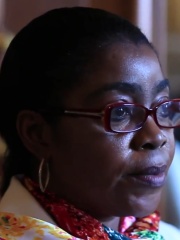
10. Rose Christiane Raponda (b. 1964)
With an HPI of 54.22, Rose Christiane Raponda is the 10th most famous Gabonese Politician. Her biography has been translated into 35 different languages.
Rose Christiane Ossouka Raponda (born 30 June 1963) is a Gabonese politician who served as the vice president of Gabon from January to August 2023, making her the country's first female vice president. She previously served as Prime Minister of Gabon from July 2020 to January 2023, she was also the country's first female prime minister. She also served as the mayor of Libreville and later as the minister of national defense from February 2019 to July 2020.
People
Pantheon has 16 people classified as Gabonese politicians born between 1902 and 1967. Of these 16, 10 (62.50%) of them are still alive today. The most famous living Gabonese politicians include François Bozizé, Raymond Ndong Sima, and Jean Ping. The most famous deceased Gabonese politicians include Omar Bongo, Léon M'ba, and Rose Francine Rogombé.
Living Gabonese Politicians
Go to all RankingsFrançois Bozizé
1946 - Present
HPI: 66.00
Raymond Ndong Sima
1955 - Present
HPI: 57.78
Jean Ping
1942 - Present
HPI: 57.13
Jean Eyeghé Ndong
1946 - Present
HPI: 54.54
Patrice Trovoada
1962 - Present
HPI: 54.34
Rose Christiane Raponda
1964 - Present
HPI: 54.22
Daniel Ona Ondo
1945 - Present
HPI: 52.53
Paul Biyoghé Mba
1953 - Present
HPI: 50.69
Julien Nkoghe Bekale
1962 - Present
HPI: 48.24
Alain Claude Bilie By Nze
1967 - Present
HPI: 42.32
Deceased Gabonese Politicians
Go to all RankingsOmar Bongo
1935 - 2009
HPI: 70.46
Léon M'ba
1902 - 1967
HPI: 65.84
Rose Francine Rogombé
1942 - 2015
HPI: 64.54
Casimir Oyé-Mba
1942 - 2021
HPI: 57.17
Léon Mébiame
1934 - 2015
HPI: 52.54
Emmanuel Issoze-Ngondet
1961 - 2020
HPI: 52.43
Overlapping Lives
Which Politicians were alive at the same time? This visualization shows the lifespans of the 6 most globally memorable Politicians since 1700.



